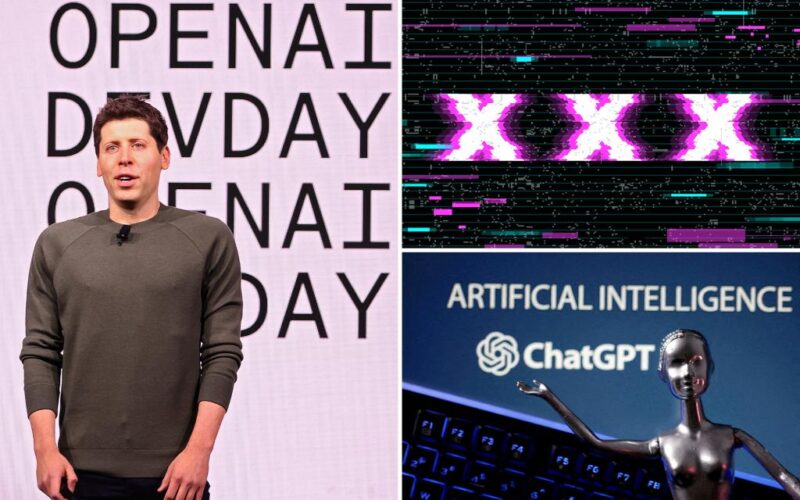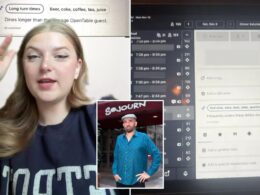OpenAI boss Sam Altman said ChatGPT will soon be allowed to engage in erotic chats with adults — despite continuing concerns over child safety and the tech mogul’s recent boast that the artificial intelligence giant had not created a “sex bot”.
Altman announced on Tuesday that OpenAI plans to “safely relax the restrictions” on hot and heavy conversations with ChatGPT now that engineers have built new safeguards around mental health content.
“Now that we have been able to mitigate the serious mental health issues and have new tools, we are going to be able to safely relax the restrictions in most cases,” Altman said in a post on X on Tuesday.
“As part of our ‘treat adult users like adults’ principle, we will allow even more, like erotica for verified adults.”
The move — expected to roll out by December — is a departure from company policy, which has historically restricted sexual content on ChatGPT.
In an Aug. 7 podcast interview with Cleo Abram, Altman was asked about a decision he made that was “best for the world but not best for winning.”
Altman replied by bragging that ChatGPT was beloved by many users because it’s “trying to help you accomplish whatever you ask.”
“That’s a very special relationship we have with our users,” Altman said. “We do not take it lightly.”
The OpenAI head then said that there were “things we could do that would…grow [the company] faster, that would get [users to spend more] time in ChatGPT that we don’t do because we know that our long-term incentive is to stay as aligned with our users as possible.”
Altman added that he was “proud of the company and how little we get distracted by that … But sometimes we do get tempted.”
When Abram asked for specific examples that come to mind, Altman said: “Well, we haven’t put a sex bot avatar in ChatGPT yet.”
Mark Cuban, the tech billionaire and former owner of the Dallas Mavericks, criticized this week’s decision, saying it was “going to backfire.”
“No parent is going to trust that their kids can’t get through your age gating,” Cuban wrote in response to Altman on Tuesday. “They will just push their kids to every other LLM. Why take the risk?”
Cuban wrote that high school seniors who are 18 years old can “decide it would be fun to show the hard core erotica they created to the 14 yr olds.”
“What could go wrong?”
The Post has sought comment from OpenAI.
OpenAI, which has faced mounting scrutiny over its product’s impact on minors, has been hit with lawsuits from parents who allege that ChatGPT offered harmful or suicidal guidance to teens.
One family filed suit against the company alleging the chatbot encouraged their son to take his own life.
OpenAI has also been accused of allowing its systems to feed sexually explicit or dangerous advice to underage users.
Federal and state regulators have opened inquiries into AI companies’ safeguards and whether they adequately protect underage users.
In recent months, OpenAI has tried to calm the furor by adding parental controls to ChatGPT and launching a restricted teen version of the app.
The new settings let parents link accounts, monitor usage, and block explicit material or self-harm content.
But advocacy groups say those fixes don’t go far enough, arguing that AI chatbots remain too unpredictable — and too powerful — to be safely placed in the hands of kids.
Lawmakers have started to devote more serious scrutiny to AI-powered chatbots and the way in which they are trained.
Sen. Josh Hawley (R-Mo.) is circulating draft legislation that would bar chatbot relationships for minors.
His proposal follows months of congressional fury at rival tech giant Meta, whose own AI assistants were trained to potentially have “romantic or sensual” exchanges with underage users.
Meta’s scandal erupted in August after Reuters published internal guidelines authorizing bots embedded in Facebook, Instagram and WhatsApp to describe children as “a work of art” and to tell a shirtless eight-year-old “every inch of you is a masterpiece.”
“The wellbeing of children should not be sacrificed in the race for AI development,” a bipartisan group of 11 senators — including Hawley, Brian Schatz (D-Hawaii) and Ron Wyden (D-Ore.) — wrote in a letter blasting CEO Mark Zuckerberg.
Meta spokesman Andy Stone said the examples were “erroneous and inconsistent with our policies” and were quickly deleted from the 200-page handbook.
By late September, Meta issued revised training instructions banning any sexualized dialogue or imagery involving minors.
Contractors were told to flag “egregiously unacceptable” prompts and restrict all role-play to characters aged 18 or older.








